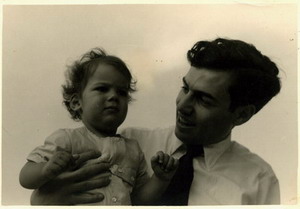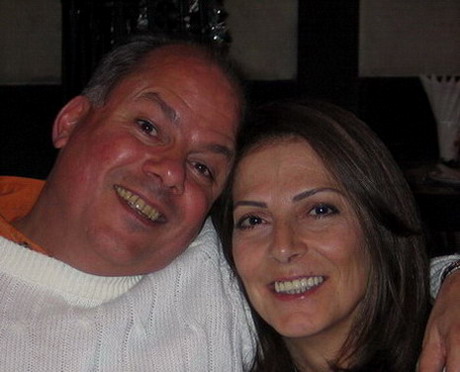Nassib welcomed me to his house, next door to the Institute and introduced me to his wife Hanan. Amazingly Hanan immediately recognized my name and spoke as if she knew me, and my family. It soon transpired that she lived in the same street I had lived in as a kid in Damascus. Hanan Bdeir was my neighbour 45 years ago. She had left Damascus in 1968 and came to Lebanon. She went to AUB where she met Nassib.
After some breakfast and coffee Nassib and I made our way to the Institute where Nassib introduced me to Reva, his trusted assistant at the Institute.


 Ibrahim from Tripoli with Nassib Solh
Ibrahim from Tripoli with Nassib SolhThe Institute was founded in 1959 by Nassib’s mother, Mrs. Mounira Solh, to care for Nassib’s older brother Salim who was born disabled some years earlier, and who sadly passed away in 2001. Al Amal (Arabic for hope) Institute for the Disabled was the first centre to open in Lebanon and the entire Middle East for the mentally handicapped. Currently the institute has over 60 mentally handicapped adults residing at the centre in Brummana. Mrs. Mounira Solh, who is now 95, has passed on responsibility of the Institute to Nassib who is the Director General.
 Mrs. Mounira El Solh, seated, founder of Al Amal Institute for the Disabled.
Mrs. Mounira El Solh, seated, founder of Al Amal Institute for the Disabled.Nassib is far left
 Nassib and Assistant Reva
Nassib and Assistant RevaThe main program at the Institute is the “Kanzat Al Shita” or “Winter Sweater” program. This is a vocational training program for manufacturing sweaters. Other vocational training programs include culinary, laundry, gardening and home-care training. Those who are potentially educable are placed in programs suitable for their level in reading, writing, mathematics, etc.



 Firas with Elie from Deir Al Ahmar
Firas with Elie from Deir Al Ahmar Firas, Elie, and Nisreen from Syria. In the back Sylvana with Ibrahim
Firas, Elie, and Nisreen from Syria. In the back Sylvana with Ibrahim



In 2002 the Amal Institute for the Disabled celebrated their 10th Anniversary of the “Winter Sweater” program. In that period they produced 88,763 sweaters. These were sponsored by people from all over the world and donated to needy persons at 69 Welfare Centres spread all over Lebanon.
 Staff and members of the Amal Institute for the Disabled meeting the President of Lebanon in 2005.
Staff and members of the Amal Institute for the Disabled meeting the President of Lebanon in 2005.
Presenting the President with a sweater marking the 100,000 sweater produced since 1992
The Welfare Centres are responsible for 16,461 orphans, 2,749 senior citizens, 1,674 people with special needs and 150 juvenile delinquents. They also employ 2,303 persons. A total of 23,337 people in need.

When South Lebanon was liberated in 2000 land belonging to the Solh family became available to the Amal Institute. This allowed the Institute to expand their “Winter Sweater” program to become the “Sweater and Wheat” program, and to start a new welfare program in South Lebanon. The program involves a partnership between Al-Amal Institute and people with special needs in rural areas of Lebanon.

People with special needs grow on their owned agricultural plots four kinds of crops: wheat, chickpeas, wide beans (foul), and lentils. These crops are suitable to grow in arid regions as they require no special irrigation, only minimal rain water.
The Amal Institute purchase all the crops grown, using funds obtained from sponsorship. The crops are processed and packed manually on their land with the help of volunteers. They are then distributed to Welfare Centres registered in the combined “Kanza wa Sunbula” (Sweater and Wheat) program. This cares for more than 23,000 needy persons all over Lebanon.
In addition to all this, the Institute organizes a variety of physical activities to motivate the students and help them appreciate the necessity of physical exercise. Other than swimming during the summer, the students follow during the whole year a program called “awareness and acceptance” that consists of integrating people with special needs with normal high school students through sporting activities. Students at the Institute have participated in the International Special Olympics three times.

Adnan from Beirut on one of the educational trips
The Institute also organizes nature activities for those special people encouraging them to appreciate the importance of environmental issues. In 1995 they planted 3000 trees on the Kneisseh mountain. Another BHS Old Scholar, Dina Azar, who was Miss Lebanon in 1995, also participated in that event.
The Institute also organizes guided tours for the students taking them around Lebanon and the Middle East to promote awareness of geography and history of Lebanon, and the Middle East. The Institute also welcomes and provides accommodation for special needs and normal people from other countries. This allows special needs people from different countries to interact and become acquainted with each other and learn from each other.
To learn more of the Amal Institute for the Disabled, they have a very basic website, http://www.alamalfordisabled.org.lb/, which provides more information.
After 3 hours talking to Nassib and visiting the Institute I left with a sense of great admiration and pride in what those special people can achieve. Nassib asked me if I can offer my help to help promote the work of the Institute, and I readily agreed to do all that I can.

Dujana from the Bika'a and Joe from Achrafieh









5 comments:
Thank you Sarmad.
I was a classmate of Nassib, so long ago now - how we find our way is always fascinating and humbling to me.
Best wishes.
Thank you for sharing that, Sarmad. A wonderfully inspiring post!
I went to the Al Amal website, but was unable to understand how I would be able to donate from the U.S. Any chance you know or can find out?
I always knew you were good at something and you have just shown it .. Well done and thanks Sarmad for your emotions... Once a DOE Orphanage carer, always ...
BHS did teach us a few things ... x
No other place to post this, but I wanted to say how BEAUTIFUL your new banner is. I recall your saying you had stitched some photos together to create this panoramic view. It's breath-taking and looks great on your blog.
Thank you Debs, I was just carrying out some tweaking to the blog when your comment came in, I'd just put up the view.
Regarding your earlier comment, it seems that the Amal Institute have an American connection and a way to donate. At their request I have created a blog for them. Check out http://nassibsolh.blogspot.com/. I will be administrating their blog until they learn how to do it themselves. They have a newsletter ready to be posted which I have completed editing today for them. They're reviewing it and I'm just waiting the OK from them before posting it on their blog.
Post a Comment